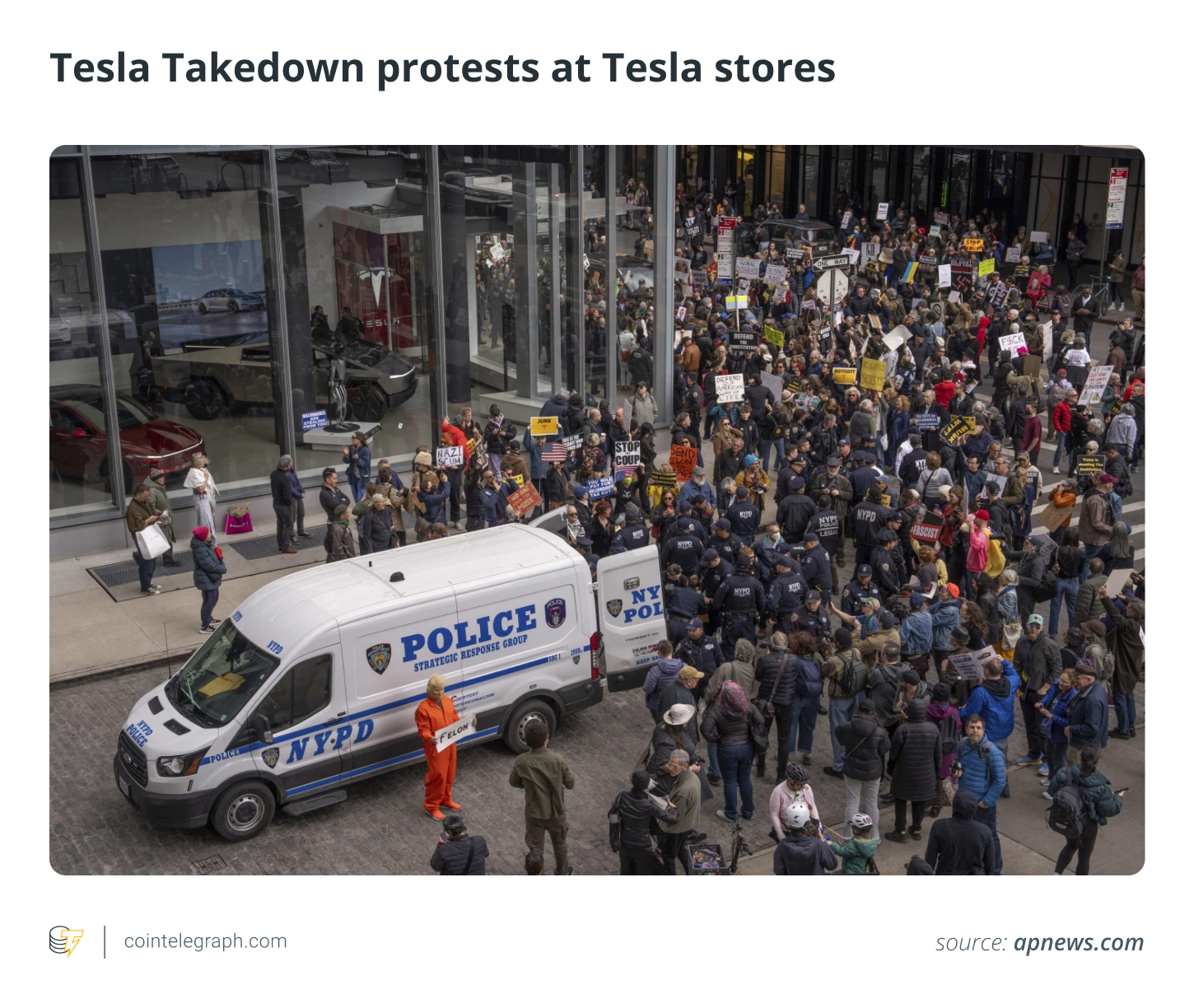What is the reason behind the protests against Elon Musk?
Once hailed as a groundbreaking entrepreneur behind companies like Tesla and SpaceX, Elon Musk is now facing increasing criticism due to his political affiliations, contentious business practices, and attention-grabbing remarks.
Born in 1971 in Pretoria, South Africa, Musk co-established Zip2 in 1995, which was purchased by Compaq in 1999. He then started X.com, which merged with Confinity to become PayPal, sold to eBay in 2002.
His subsequent enterprises, SpaceX (2002) and Tesla (2004), cemented his reputation as a key innovator in aerospace and electric automobiles. In 2022, he acquired Twitter for $44 billion, later renaming it X and integrating it into a broader vision of an “everything app.”
Initially lauded for his technological advancements, Musk’s public reputation shifted in the late 2010s for several reasons:
- Political engagement: Musk’s connection to conservative politics, especially his support for former President Donald Trump and leadership of the Department of Government Efficiency (DOGE), attracted backlash. His advocacy for substantial cuts to federal spending and the elimination of certain programs sparked dissatisfaction.
- Business practices: Actions such as moving Tesla’s headquarters from California to Texas and adopting controversial labor strategies contributed to negative evaluations of him. Critics viewed these moves as prioritizing profits over the welfare of employees and adherence to regulations.
- Controversial remarks: Musk’s communications, particularly on social media, often stirred debate. Critics accused him of disseminating misinformation and endorsing conspiracy theories, decreasing his credibility with certain communities.

Did you know? Contrary to the popular belief of Musk as a self-made entrepreneur, he actually hails from a financially well-off family. His father, Errol Musk, is alleged to have owned an emerald mine in Zambia, and Elon has noted that he received financial assistance from his family in his early business endeavors.
Protests against Elon Musk in 2025
By 2025, the factors mentioned previously resulted in widespread demonstrations against Musk and his business operations.
The protests were fueled by several key grievances:
- Income inequality: Musk’s wealth, which peaked at $400 billion in December 2024 and dipped to $298 billion by April 2025 due to market fluctuations and political scandals, exemplified growing economic disparities. Protesters viewed his wealth accumulation as reflective of systemic problems benefiting the ultra-rich.
- Political clout: Musk’s extensive political involvement, particularly his advisory capacity to Trump and impact on DOGE policies, raised alarms about the concentration of authority among the affluent. Critics worried that this influence compromised democratic principles and favored corporate over public interests.
- Business ethics: Decisions characterized by aggressive cost-cutting, alleged labor exploitation, and disputed corporate strategies led to unrest among employees and customers. The “Tesla Takedown” initiative specifically targeted Tesla showrooms, questioning Musk’s leadership and business tactics.
- Social and environmental impacts: There was also considerable scrutiny regarding the social and environmental ramifications of Musk’s business choices. Protesters challenged Tesla’s labor practices and assessed the environmental effects of some initiatives, demanding more responsible and ethical corporate conduct.
Did you know? A March 2025 op-ed pointed out that DOGE’s name was a “branding blunder,” while a CNN/ORC poll revealed that 62% of the public considered it “inappropriate” for a government agency, with 44% believing it damaged confidence in the administration’s reform initiatives.
Tesla protests in 2025
The “Tesla Takedown” movement, featuring demonstrations in over 250 cities globally, aimed to challenge Musk’s dominance.
Initiated in early 2025, this grassroots movement organized peaceful protests at Tesla locations across the US, Canada, Europe, and Australia.

Demonstrators called for boycotts and encouraged the public to divest from Tesla by selling their vehicles and shares, aiming to impact Musk economically and question his political influence.
Two primary concerns drove the protests:
- Labor practices: Tesla faced allegations of violating labor rights, including reports of workers being terminated for voicing dissent. The National Labor Relations Board had 24 ongoing investigations into Musk’s companies, including accusations of illegal dismissals at SpaceX.
- Environmental issues: Protesters raised alarms about Tesla’s environmental track record, emphasizing allegations of negligence in solar panel installations, which resulted in roof fires at Walmart locations. Walmart subsequently filed a multimillion-dollar lawsuit against Tesla, claiming that faulty installation and maintenance of solar panels led to roof fires at several stores dating back to 2012.
Falling sales figures highlighted consumer dissatisfaction. In the first quarter of 2025, Tesla’s global vehicle deliveries decreased by 13% year-over-year to 336,681 units, reflecting the company’s poorest quarterly results since mid-2022.
Did you know? While meant to be nonviolent, certain protests escalated into vandalism. For instance, on March 24, 2025, incendiary devices were found at a Tesla dealership in Austin, Texas.
SpaceX controversies in 2025
SpaceX also attracted significant scrutiny, particularly concerning safety and adherence to regulations.
The Starship explosion in 2025 underscored the dangers inherent in private space exploration. The largest rocket ever constructed tragically disintegrated moments after liftoff, scattering debris across protected regions and reigniting discussions about safety, environmental responsibility, and regulatory oversight within the private spaceflight sector.

Musk’s engagement in political matters further complicated the situation. As the head of DOGE, he supervised major federal spending cuts and deregulation efforts, creating potential conflicts of interest, particularly regarding regulatory bodies overseeing his enterprises.
For instance, SpaceX incurred fines from the Federal Aviation Administration for safety infractions, which included operating an unapproved launch control center and utilizing non-approved rocket fuel, amounting to $633,009 in total penalties.
What does the future look like for Elon Musk amid intensifying criticism?
Musk’s involvement in political matters, particularly his advisory role to the former president and leadership of DOGE, has resulted in considerable public discontent.
A poll from February 2025 indicated that 52% of Americans viewed Musk unfavorably, while only 29% expressed approval.
In light of the growing criticism, there are reports suggesting that Musk may consider stepping away from his advisory role to focus on his business interests. This potential shift could be aimed at reducing public perception that his political engagements are negatively affecting Tesla’s performance.
Nevertheless, given Musk’s record of making unconventional decisions and his resilience, it remains uncertain whether distancing himself from political affairs will fully alleviate public dissent or restore consumer trust in Tesla.
